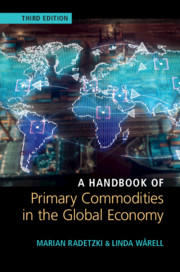Book contents
- A Handbook of Primary Commodities in the Global Economy
- A Handbook of Primary Commodities in the Global Economy
- Copyright page
- Contents
- Figures
- Tables
- Acknowledgments
- Introduction
- 1 The Historical Framework
- 2 The Geography of Commodity Production and Trade
- 3 Comparative Advantage and Trade Policy Distortions
- 4 Fossil Fuels
- 5 Price Formation and Price Trends in Commodities
- 6 Commodity Booms
- 7 Commodity Exchanges, Commodity Investments and Speculation
- 8 Sustainability and the Threats of Resource Depletion
- 9 Fears of and Measures to Assure Supply Security
- 10 Producer Cartels in International Commodity Markets
- 11 Public Ownership of Commodity Production
- 12 The Monoeconomies: Issues Raised by Heavy Dependence on Commodity Production and Exports
- References
- Index
1 - The Historical Framework
Published online by Cambridge University Press: 06 November 2020
- A Handbook of Primary Commodities in the Global Economy
- A Handbook of Primary Commodities in the Global Economy
- Copyright page
- Contents
- Figures
- Tables
- Acknowledgments
- Introduction
- 1 The Historical Framework
- 2 The Geography of Commodity Production and Trade
- 3 Comparative Advantage and Trade Policy Distortions
- 4 Fossil Fuels
- 5 Price Formation and Price Trends in Commodities
- 6 Commodity Booms
- 7 Commodity Exchanges, Commodity Investments and Speculation
- 8 Sustainability and the Threats of Resource Depletion
- 9 Fears of and Measures to Assure Supply Security
- 10 Producer Cartels in International Commodity Markets
- 11 Public Ownership of Commodity Production
- 12 The Monoeconomies: Issues Raised by Heavy Dependence on Commodity Production and Exports
- References
- Index
Summary
This introductory chapter provides a historical framework for world commodity markets. It considers four major themes. The first theme reviews the significance of primary commodities in the overall economy at different stages of economic development. The second tracks the long-run decline in bulk transport costs and explores the implications of this decline for the establishment of markets with a global reach for an expanding group of raw materials. The third theme focuses on the twentieth century. It demonstrates the greatly expanded role of public intervention and control in primary commodity production and trade from the early 1930s until the late 1970s, and the subsequent retreat of government involvement in favor of market forces. The fourth treats the recent strong growth in emerging economies, which has had, and continues to have, a profound impact on the world commodity markets.
Keywords
- Type
- Chapter
- Information
- Publisher: Cambridge University PressPrint publication year: 2020

